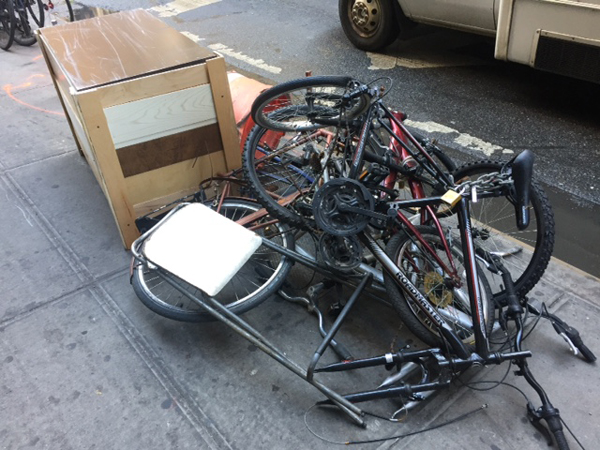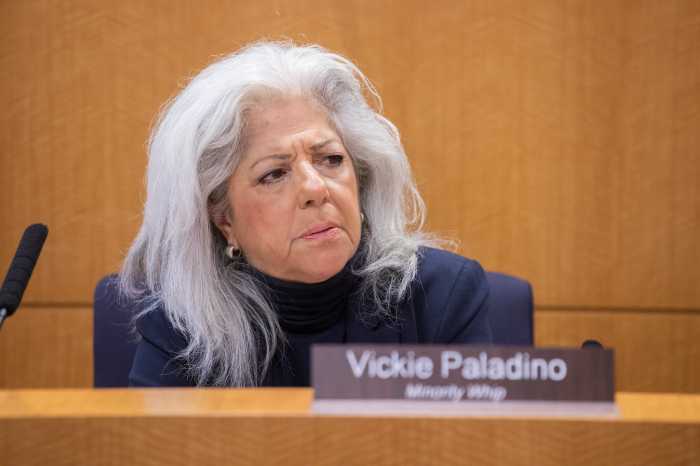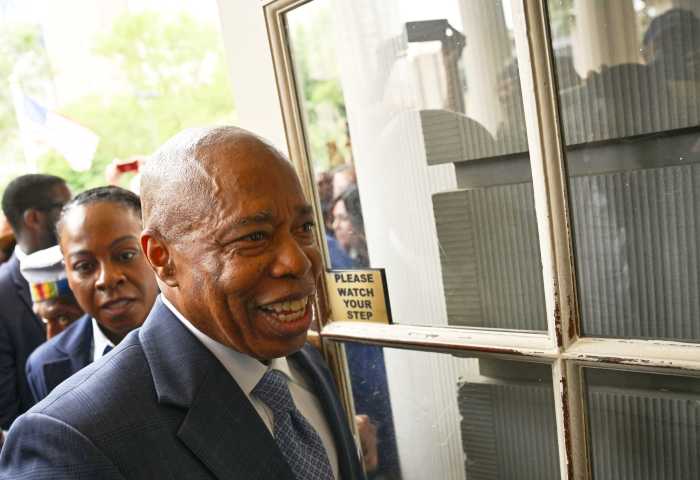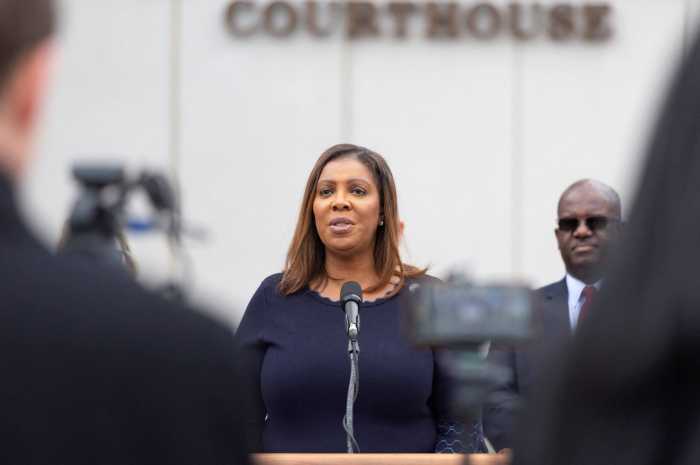
BY DUSICA SUE MALESEVIC | The Midtown South Community Council (MSCC) didn’t wait for spring to set their sights on removing a winter’s worth of clutter from the sidewalks of Hell’s Kitchen. The group’s March 16 meeting, held four days prior to the calendar’s change of seasons, saw the council determined to clean up sidewalks by carting off derelict bikes, clipping off milk crates from signposts, and promoting the city’s “Adopt-a-Basket” program.
The group is also studying the idea of establishing a modular news rack program similar to the one run in Midtown East by the Grand Central Partnership, in the hopes of eliminating the scattershot placement of news boxes that currently dot the neighborhood.
“What we’ve got around the neighborhood is these plastic magazine holders, and they’re always beaten up and look atrocious,” John A. Mudd, the council’s president said at last week’s meeting. “Our plan is to get rid of them — put something out there that’s nice.”
Recently, Mudd, Eugene Sinigalliano, the council’s beautification director, and Kathy Kahng of CityRax walked around Midtown and counted 128 individual news boxes. Kahng manages the Grand Central Partnership news rack program. Fifty publishers participate in that program, which she noted is voluntary.
“We provide them with news racks and they put their publications in,” Kahng explained to those gathered at the New Yorker Hotel on Eighth Avenue at 34th Street.
There are five other programs like this in the city, she said, and some have received grants from city councilmembers. The grants have covered capital expenses, though there is still a need for funding for upkeep, she said.
“The reason you don’t see too many of these programs is because it’s expensive,” Kahng said. “And to turn around and say, ‘Okay, well I’m going to make the publishers pay for that’ — there’s too many First Amendment concerns. So really unless you have a third party like yourselves or one of the [business improvement districts] to underwrite the program and manage it, it’s not going to happen.”
The council is sponsoring a design contest for the multi-box units, with details to be released soon.
The council has also been at work cleaning up sidewalks in Midtown.
“We’re just going to clear the trash in the streets — the excess trash,” Mudd said. “The derelict bikes, the bikes that have been chained to either the fence or the signposts for a long time. Try to make the neighborhood look a little bit nicer.”
Sinigalliano, however, noted, “Some of the stuff has been there a long time, but we can’t truly call it derelict. If it has value we can’t just throw it out, it has to be vouchered.”
At the last cleanup operation on February 24, the council put up signs warning people not to attach things to city property, Mudd said.
The council is also promoting the Department of Sanitation’s “Adopt-a-Basket” program, Sinigalliano said.
“It’s a very simple program and very ingenious,” he explained. “Basically, Sanitation can’t empty the baskets as fast as some baskets in very busy areas fill up. So rather than overflowing all over our streets and creating a hazard, businesses agree to adopt a basket.”
Sanitation provides bags to the businesses, so they can take care of changing out the bag when the basket is at capacity.
NYPD Midtown South Inspector Russell Green also appeared before the council and said that 85 percent of the crimes his precinct deals with are grand larcenies and robberies. Theft often occurs when property is left unattended, he said, and the Manhattan district attorney’s office will soon launch a campaign to remind people to “Watch Your Stuff.”
“The inspector mentioned it earlier in his report that grand larceny is a huge problem and he’s absolutely right,” said Edgar Yu of the DA’s office. “It’s not a problem just in Midtown South but, in fact, accounts for 70 percent of the indexed crimes south of 59th. All 10 precincts south of 59th Street, grand larceny continues to be a huge problem.”
Yu said the office has designed a “multi-faceted campaign and social media strategy” to help address the issue.
“The reality is, this can be prevented,” he said, touting the “Watch Your Stuff” initiative.





























